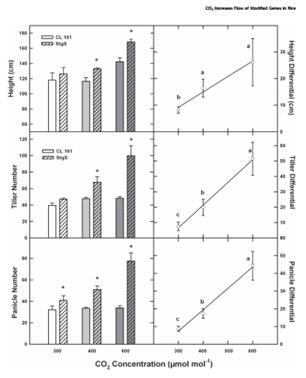品质至上,客户至上,您的满意就是我们的目标
技术文章
当前位置: 首页 > 技术文章
植物学大会参展之-EGC步入式植物生产培养室
发表时间:2017-05-26 09:36:55点击:2446
来源:博普特
分享:
下面是科学家用EGC植物生长培养室发表文章所用的材料和方法部分描述,详细EGC产品介绍请访问产品链接。
材料和方法
研究使用了控制环境步入式植物培养室 (EGC Corp., Chagrin Falls, OH) ,目前还没有可将植物每天置于低于环境二氧化碳浓度的方法。
每个培养室的温度的每日波动范围是晚上较低为22℃,下午较高温度为32℃,每天(24h)平均值为24.4℃。
以光合有效辐射提供的光(PAR)每日与温度一起变动,较高PAR (,900 mmol m2 s21) 值出现在下午。每日光照时间为14h,光照由高压钠灯以及金属氦灯提供,所以生长室平均为20.9 mol m22 day21 。所注入的含有CO2或不含CO2的空气使用TC-2控制器测定,所监控[CO2] 得测量通过有效近红外气体分析仪(WMA-2, PP Systems, Haverhill, MA, USA)实现。二氧化碳浓度设置在 300, 400和600 mmol mol21 24 h day21。
Recent and Projected Increases in Atmospheric CO2 Concentration Can Enhance Gene Flow between Wild and Genetically Altered Rice (Oryza sativa)
Lewis H. Ziska1*, David R. Gealy2, Martha B. Tomecek1, Aaron K. Jackson2, Howard L. Black2
1 Crop Systems and Global Change Laboratory, United States Department of Agriculture, Agricultural Research Service, Beltsville, Maryland, United States of America,
2 Dale Bumpers National Rice Research Center, United States Department of Agriculture, Agricultural Research Service, Stuttgart, Arkansas, United States of America
Abstract
Although recent and projected increases in atmospheric carbon dioxide can alter plant phenological development, these changes have not been quantified in terms of floral outcrossing rates or gene transfer. Could differential phenological development in response to rising CO2 between genetically modified crops and wild, weedy relatives increase the spread of novel genes, potentially altering evolutionary fitness? Here we show that increasing CO2 from an early 20th century concentration (300 mmol mol21) to current (400 mmol mol21) and projected, mid-21st century (600 mmol mol21) values,enhanced the flow of genes from wild, weedy rice to the genetically altered, herbicide resistant, cultivated population, with outcrossing increasing from 0.22% to 0.71% from 300 to 600 mmol mol21. The increase in outcrossing and gene transfer was associated with differential increases in plant height, as well as greater tiller and panicle production in the wild, relative to the cultivated population. In addition, increasing CO2 also resulted in a greater synchronicity in flowering times between the two populations. The observed changes reported here resulted in a subsequent increase in rice dedomestication and a greater number of weedy, herbicide-resistant hybrid progeny. Overall, these data suggest that differential phenological responses to rising atmospheric CO2 could result in enhanced flow of novel genes and greater success of feral plant species in agroecosystems.
Materials and Methods
Controlled environment chambers (EGC Corp., Chagrin Falls, OH) were used because, at present, no methodology is available that can expose plants to sub-ambient carbon dioxide concentra- tions [CO2], for 24 h day21 [35]. Temperature for each chamber was varied in a diurnal mode from an overnight low of 22uC, to a maximum afternoon value of 32uC, with an average daily (24 h) value of 24.4uC. Light as photosynthetically active radiation (PAR) varied diurnally in conjunction with temperature, with the highest PAR (,900 mmol m2 s21) occurring during the afternoon. The daily light period was 14 h, supplied by a mixture of high-pressure sodium and metal halide lamps, and averaged 20.9 mol m22 day21 for all chambers. Injection of either CO2 or CO2-free air was determined using a TC-2 controller that monitored [CO2] measured from an absolute infrared gas analyzer (WMA-2, PP Systems, Haverhill, MA, USA). Carbon dioxide concentrations were set at 300, 400 and 600 mmol mol21 24 h day21。